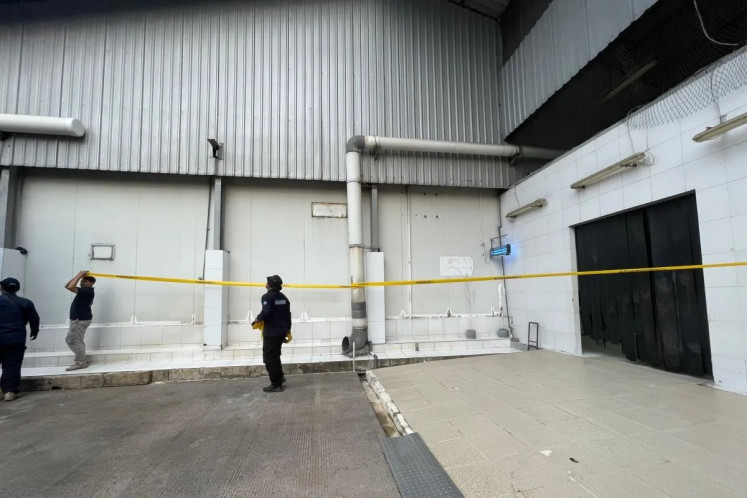Popular Reads
Top Results
Can't find what you're looking for?
View all search resultsPopular Reads
Top Results
Can't find what you're looking for?
View all search resultsNon-native vs native English teachers
To speak the global language has been an ultimate priority of Indonesian parents living in several cities nowadays
Change text size
Gift Premium Articles
to Anyone
T
o speak the global language has been an ultimate priority of Indonesian parents living in several cities nowadays. They highly expect their children to speak English flawlessly. Therefore, they send their children to private schools and language institutions that employ English as a lingua franca.
Suffice it to say, they need to spend so lavishly so that the best teachers, preferably native speakers of English who can highly expose their children with “good and natural” English, teach their children. To meet the parents’ needs, a number of private schools and language institutions hire many native speakers of English (NTs). They are believed to teach English “better” than the non-native teachers (NNTs).
It is not necessarily horrible if the schools and institutions only employ qualified teachers or tutors with both language and pedagogy skills. Needless to say, both should exist.
Munoz claims that native speakers can convey such input if only they are pedagogically equipped. However, we can easily find premium language institutions hiring NTs with no degrees in teaching language. While most of the NNTs must hold a degree in Teaching English as a Foreign Language (TEFL), NTs can teach only by owning an online teaching certificate. Most of them, if not all, graduated from a various array of educational backgrounds except English teaching.
NTs certainly have a plus. However, the method to deliver the lesson plays another key point in a learning process. While there are few English native speakers who are pedagogically equipped, I am also under the impression that there are many of them who lack this skill. It goes without saying that lacking an appropriate method of teaching may harm the children’s acquisition process. In the long run, it may hinder their ultimate attainment of the language.
The question that we need to highlight is whether they are capable enough to teach the language appropriately without having sufficient knowledge of language methodology? The pivotal reason for having pedagogical skill is simply reasonable; language learning, especially for children, is really crucial; at this stage they acquire the language that they may retain for their whole lives. If the teachers only know the language with zero knowledge of method, it will lead to a condition where children do not necessarily learn the language, or they learn language the wrong way.
I once witnessed students end up playing games in one class without necessarily learning any lesson. Apparently a communicative and meaningful game is not every teacher’s idea. Another unforgettable experience was when I overheard some elementary students shout the “F” word outside their class. To my surprise, they said their teacher, who happens to be a NT, often used the word in class.
Another bad impression that I encountered was that some NTs could not explain some prescriptive grammar and often consulted the Grammar for Dummies book in the teachers’ room, the book that was not necessarily sophisticated enough for a “language teacher”.
I do believe many native teachers are excellent; but there are also many who lack pedagogical skills, which then raise a question about recruitment. Apparently, certain language institutions do not set a high standard for native teacher applicants. It may be safely assumed that the Indonesian Ministry of National Education does not have a specific rule about hiring NTs to teach in the country.
As a comparison, we may look at how the United States, through the Department of State, Bureau of Educational and Cultural Affairs, select foreign language teachers to teach in the universities. The FLTA (Foreign Language Teaching Assistant) program requires at least a two-year experience of teaching, a degree in language teaching (often a master’s degree is required) and at least a 550 TOEFL (Test of English as a Foreign Language) score. Having all the requirements, the prospective FLTAs should undergo a set of competitive selection processes. The US government highly believes that a language teacher with an appropriate background should be the one teaching their students.
I reckon it is not a bad idea now, in retrospect; do the NTs who wish to teach in Indonesia have to go through any of this selection process and have one of these requirements?
Another question to bear in mind is that what’s with the NNTs with a TESOL (Teachers of English to Speakers of Other Language) certificate? Are they not equally comparable? Limiting their opportunity to teach the language to the children may not provide them a fair game. Not to mention, many are cornered and get a lower salary than the NTs with a lower educational background.
It should be highlighted that they are not necessarily worse or even can surpass the NTs in teaching the language. Additionally, these NNTs may want to offer innumerable advantages. To be able to code-switch effectively in order to facilitate the students’ understanding is one of them.
To put it in a nutshell, I should pinpoint that a significant exposure is one contributing factor to successful language learning, among others. However, viewing native English teachers as the only agents who can do such a task may not be reasonable.
We need then to emphasize that both native and non-native teachers of English are to be on the same page: Both parties should at least have a solid background of English pedagogy, in addition to their language skills. Parents, government and the institutions should then set a comprehensive rule for the foreigners to teach in Indonesia so that all can be satisfied.
The writer is a Fulbright presidential scholar and a Ph.D student at SLA Program, UW-Madison, the United States.










